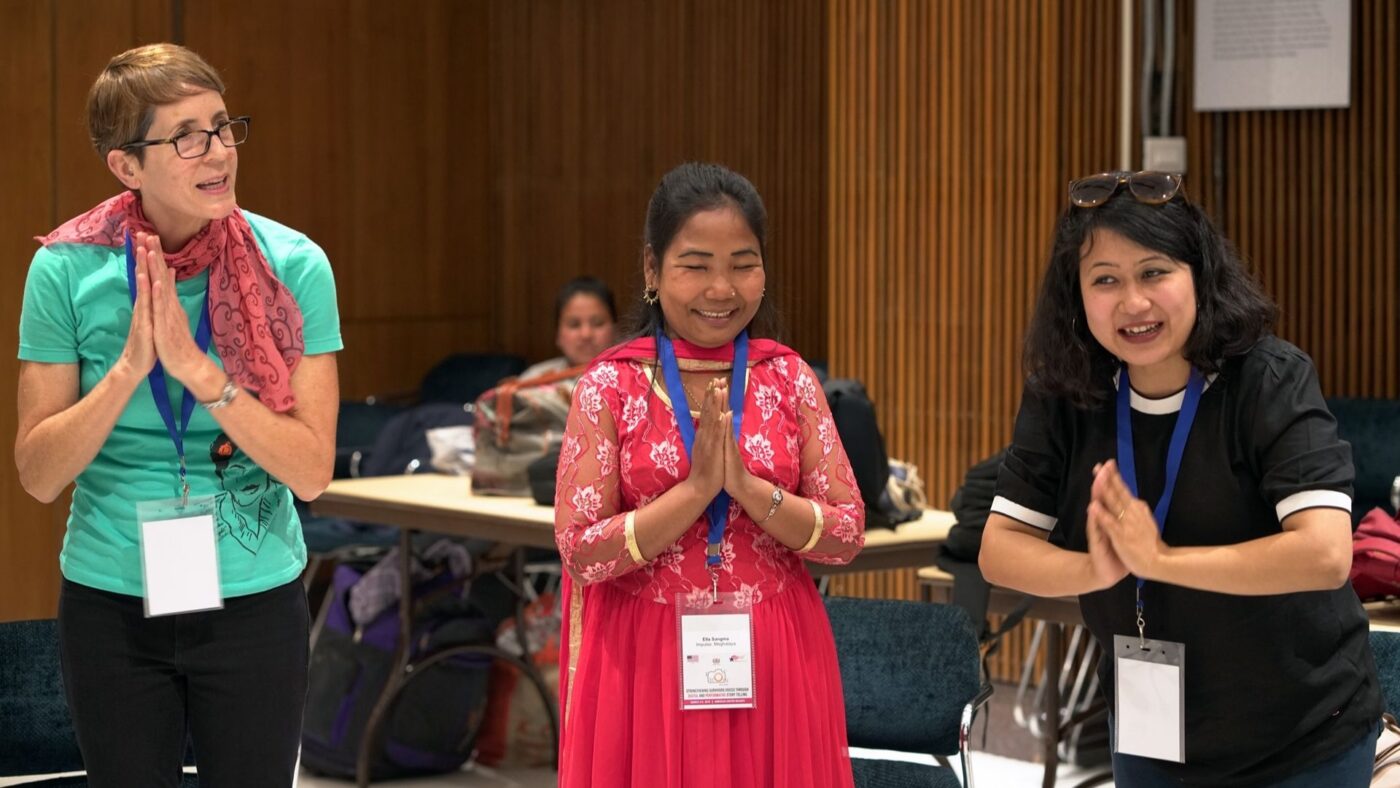An international partnership between Theater Alliance, Story Center and Shakti Vahini transforms the powerful stories of human trafficking survivors into agency and tools for change.
December 2021

Over the course of five days, during the workshop titled, “Ending Human Trafficking in India,” theater games, performative storytelling activities and story sharing were blended to build community amongst the group. Photograph courtesy Amy Hill
“When I was in grade nine, I used to go to a computer class. Outside the training center, I met a boy. We talked a little. We became friends. At least I thought he was my friend.” – M
“After we reached the big city, they put us into a hotel. I found out there was no job–it was a lie. Two women came and demanded I go with them. They said, “We bought you.” I wondered, how can you buy a human? I could do nothing.” – Ela
“Back when I was 17 years old, my parents wanted to marry me off. I had just passed 12th grade–I wanted to continue my studies. I didn’t want to be a wife so early. When I told my aunt what was happening, she suggested I come with her to Delhi, to find work.” – Parwati
“My father always wanted a son, but he got six daughters, including me. I hated being at home because he always scolded me for no reason. He beat all of us too. When I heard that a boy from our village was leaving for Delhi, and that he could get me a job there, I decided to go with him.” – Asrita
“He gave me a cola. Right away my head was spinning, like I was going to pass out. I tried to ask for help…but I could not speak. When I came around, I was on a train.” – Anonymous
The United Nations defines human trafficking as the “recruitment, transportation, transfer, harboring or receipt of people through force, fraud or deception, with the aim of exploiting them for profit.” On its website, the United Nations explains that “men, women and children of all ages and from all backgrounds can become victims of this crime, which occurs in every region of the world.”
In 2019, Theater Alliance, Story Center, Shakti Vahini and the American Center in Kolkata launched a pilot project titled, “Ending Human Trafficking in India,” that brought to life the definition that affects individual lives, families and communities by collecting and sharing the powerful stories of survivors. The project uses innovative approaches to extend people-to-people programs, and engage communities and partners, including a five-day workshop led by digital storytelling experts from the California-based StoryCenter and performative storytelling from the District of Columbia-based Theater Alliance.
Advocating for justice
“The workshop was a great chance for the participants to share their stories in their own words and, thus, achieve agency over the telling of their own stories,” says Amy Hill, a facilitator from the StoryCenter. “Their experiences and stories express the everyday realities of young women affected by human trafficking and gender-based violence.” Participants were young women who had either been subjected to human trafficking or had personal a personal connection to trafficking and gender-based violence.
Raymond Caldwell, from the Theater Alliance, credits Shakti Vahini for providing much of the necessary preparation for the program. “I take a lot of inspiration as an artist from classical Indian narratives,” he says. “My core research in the United States has always been around the transformative power of storytelling, and it was fantastic to see the connections we were able to make and how we were able to move research to reflect the real lives and experiences of the survivors.”
Performance and art
Over the course of five days, theater games, performative storytelling activities and story sharing were blended to build community amongst the group. “The young women storytellers were supported by small teams of previously trained young people who we had worked with earlier, and who were familiar with our methods,” says Amy. “We needed to create trust and connection, so Raymond led fun, interactive games that allowed people to get to know each other and let down their guard. To address language challenges, we had interpreters throughout.”
Digital storytelling techniques were integrated across the workshop in phases. Participants initially shared their stories in small groups and a story circle. As the workshop progressed, participants recorded their stories, created image boards, and learned how to edit their recordings. “On the last day, we finalized the videos and did an informal, internal screening. About a week later, we did a formal screening”, said Amy. She and Raymond found the courage and resilience of the young participants inspiring. “Many of them did not see themselves as a victim,” says Raymond. “For them, this was a moment in their lives they were working to get past.”
The videos created were shared to commemorate the world day against trafficking in persons and continue to be screened in locations across India. The videos are also used in training designed to sensitize police personnel. “The police are among the first responders in situations like these”, says Ravi Kant, CEO of Shakti Vahini. “These brave stories are extremely helpful in explaining how law enforcement should tackle such circumstances and understanding the psychology of survivors.”
Paromita Pain is an assistant professor of Global Media Studies at the University of Nevada, Reno.
COMMENTS